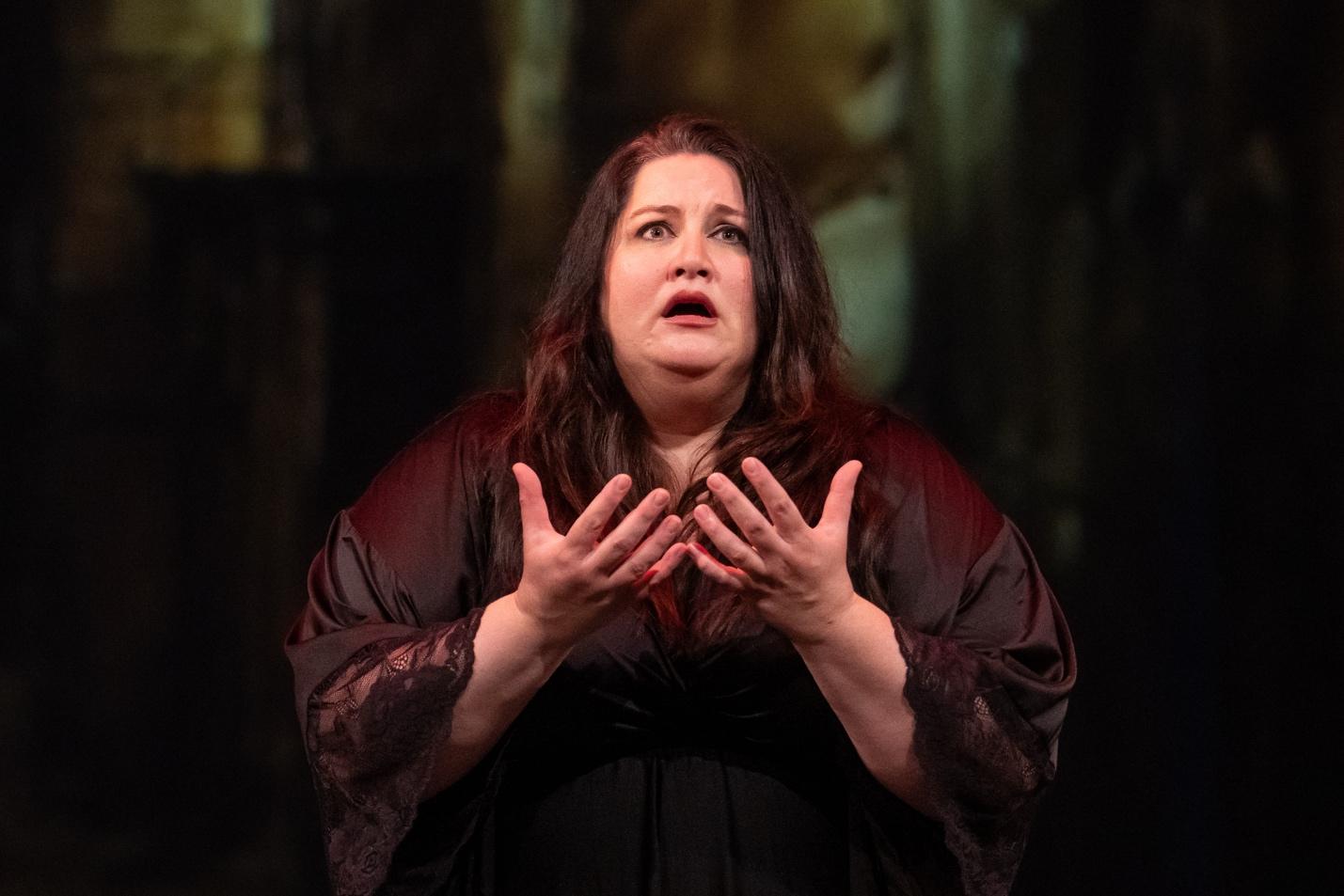
Under the artistic direction of Will Crutchfield and musical direction of Jakob Lehmann and Elisa Citterio, Teatro Nuovo is a thoroughly learned company—their aim is historical reconstruction, which often means their performances are more musicological than dramatically satisfying. Their program materials, however, are works of art in themselves; the depth of research presented with such lightness makes clear the strength of Teatro Nuovo’s pedagogical project. Their works are semi-staged, performed without costumes; much rests on the caliber of the soloists and the orchestra as well as on the (ironic) novelty of hearing familiar works in long-lost versions. This is sometimes a losing gamble, and one walks away seeing all the merits of the revised scores one is used to hearing. If soloists falter vocally, there is little directorial vision to make up for the gaps.
This season, they presented a double bill: the 1847 version of Verdi’s Macbeth and Bellini’s beloved La Sonnambula of 1831, which here appears both in original keys and on period instruments. The combination of opera seria and semiseria made for a strong display of what Teatro Nuovo does best, even if it also highlights some of the pitfalls of their house style.
Verdi revised his Macbeth nearly twenty years after the opera first premiered, the composer having escaped the most productive—and the most miserable—period of his career that he called “the galleys.” The 1865 version is more dramatically concise, but the music is a mixture of Verdi’s early and mature styles. Therefore, it is fascinating to hear a version where Verdi had not yet become the first name in Shakespeare opera settings, and one where Macbeth had become popular Italian stage.


The 1847 Macbeth has a slightly lighter feel, despite its textual source, and its central couple is tipped slightly more into haplessness than cunning. Macbeth attributes his downfall to his trust in devilish prophesies, a bit of moralizing that anticipates the self-delusions of Rigoletto, albeit without the bitter irony of that opera. Instead of a somewhat cryptic power vacuum, Macbeth talks about himself more and needs more self-dispensed pep talks. Lady Macbeth is less monstrous here; she also appears less frequently, to the opera’s detriment. The third act, essentially a series of monologues for Macbeth with the witches as his audience, drags on too long. Without his queen, Macbeth is simply less interesting, though perhaps a fully staged version could at least give some visual heft to the supposedly terrifying surroundings.
It is fascinating to hear this music, though, if only to become reacquainted with Verdi’s tight, workmanlike early style. As directed by Lehmann, this was also a very satisfying performance. The orchestra played with a crisp vigor, especially as they settled into the evening.
In addition to upgrading to swanky new digs at City Center, Teatro Nuovo has upped the caliber of its soloists this year. Ricardo José Rivera, as the title character, has a staunch yet limber baritone and a good ear for Verdi, able to imbue the antihero with power and vulnerability. Cumhur Görgün as Banco was a fine match for Rivera, similar in power but with a more emotive quality to his fine, robust voice. Together with Martin Luther Clark’s Macduff, Görgün is the moral center of this opera. Clark, whose gleaming tenor is complemented by a beautiful stillness and intention in his physical presence, was another highlight of the show, singing Macduff’s showstopping aria in the fourth act with both command and raw emotion.


But soprano Alexandra Loutsion as Lady Macbeth was the revelation of the evening. She has a vigorous and powerful sound with adequate flexibility to match her strength. Most pleasingly, she retained a warmth even as her character became increasingly out of control. Loutsion is well-suited to the role’s wide-ranging demands, and her captivating presence commands attention. Time sped up whenever she appeared onstage and slowed when she departed.
Macbeth is harder to pull off in Teatro Nuovo’s performance style because it cries out for atmosphere. The witches need to be weird, the castle needs to be haunted and the various ghostly scenes need to be scary—these things are hard to pull off in a semi-staged format. There were moments of awkwardness, to be sure, and some unintentionally humorous moments, but overall, it was a more polished performance than I’ve ever seen from Teatro Nuovo. La Sonnambula worked best in TN’s performance style, in part because its humor is intentional and in part because the actors were given more to do.


Sonnambula saw the chorus in brightly colored formal wear, as if all of them were going to an Easter parade. All in all, they made for a much more entertaining village in this opera than the stiff and sore collection of courtiers and unhappy citizens they played in Macbeth. The town in Sonnambula (to use a cliché from film criticism) is a character in and of itself, driving the drama and injecting a welcome dose of humor and charm that worked well even in semi-staged format.
Citterio’s musical direction brought out much of what makes Bellini so beloved by fans, even if, as the program insists, critics took longer to come around. The music bubbles with clarity and joy, especially in the numerous chorus scenes, and the trumpet duet that starts off the second act is nothing short of delightful.


Tenor Christopher Bozeka has a bright, appealing sound as Elvino as well as a clever comedic instinct that made him lovable even in his character’s folly. Bozeka seems straight out of the golden age: relentlessly forward and wonderfully ostentatious. He struggled to ascend to high notes, though, which marred his otherwise smooth performance as the befuddled and jealous lover. As Elvino’s rival and long-lost Count Rodolfo, Owen Phillipson navigated the switchbacks of this uneven character nicely. He has a dry, brisk bass-baritone that will likely flesh out with time. Abigail Lysinger, as town-favorite Amina’s mother Teresa, and Vincent Graña both made meals of small roles, with Lysinger offering a tempered mezzo-soprano that belied her youthful appearance and Graña singing with a surprisingly bright and flexible bass-baritone.
But in Sonnambula, as in Macbeth, the leading ladies ruled the day. Teresa Castillo delivered a sterling performance as Amina and has all the makings of a renowned bel canto heroine, from her graceful coloratura to her warm and plaintive middle voice. Even the role’s rather surprising low notes left her unfazed; this was a near-perfect vocal performance, done with ease and a natural affability that suited Amina’s hometown-hero status as the popular girl who’s so nice that no one can even hate her for being the favorite.
The breakout star, however, was Abigail Raiford as the flirty, scheming Lisa (who finds she can hate Amina, at least for a little while). Her voice is silvery, agile and full of attitude, as is her physical presence. Raiford has all the sass and sharpness in spades for any soubrette role. Despite Amina’s obvious goodness, I couldn’t help but root for her to win the day—not the jealous and fickle Elvino, but the Count, or even better, a ticket out of this adorable town—all a testament to Raiford’s vivacious charm. Teatro Nuovo’s project has always been admirable, but they finally have the talent to make their case along vocal as well as historical lines.
More in performing arts
<




